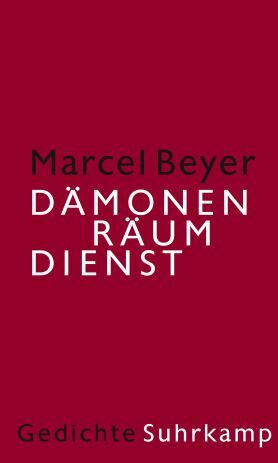Marcel Beyer
Dämonenräumdienst
[Demon Clearing Service]
- Suhrkamp Verlag
- Berlin 2020
- ISBN 978-3-518-42945-7
- 173 Pages
- Publisher’s contact details
For this title we provide support for translation into the Greek language (2019 - 2021).
More
Sample translations
Rousing Roundelay of Ghosts
The term “sound” is essential to Beyer’s poetic practice. Not only does it apply to his affinity with music, but also to his creative approach on the sonic dimension of language and with the resonance chamber of words, names, slogans, and aphorisms. For the volume Dämonenräumdienst, he primarily mapped out the sound that shaped his own youth in West Germany and then rearranged it for the present - the result is strange, ironically cut up and often surreally distorted, and yet the sound is astonishingly recognizable.
The author discovered the material while cleaning out his archive and in the storehouse of his memory. The “demons” that Beyer summons in his mind in order to, as it were, exorcise them are occasionally creepy but they only pose a threat on very rare occasions. They correspond then to the “daemon” of Greek mythology, as they are fundamentally neither good nor evil. Making an appearance are the ghosts of the dead, the ghosts of artists and major fellow poets, ghosts of tabloid stars and heroes from pop culture, who, as revenants, behave mischievously or can’t find any peace because posterity keeps summoning them. Demons in this sense also include characters in movies as well as mythical creatures, they are images from childhood, scenes and phantasms of every kind, which haunt the writer’s subconscious until he contains them with language.
This is performed in a strict form of ten four-line stanzas, which is sustained over the course of 76 poems. Within these parameters, Beyer allows his capricious figures to dance and gallivant; they often assume pretences of deception and cunningly entice the reader towards abysses, only to then tear off their masks, revealing hidden associations. With complicated words and meandering sentences, the poet creates highly comical situations as well as subtle shock effects, acrobatically balancing between an analysis of society and delightful inventiveness in its purest form.
Whoever translates this lyrical roundelay of ghosts would also have to be very inventive, and yet he or she, like Beyer himself, could remain very nimble in the clearly structured framework - with its free rhythms and abruptly changing beats, with the alternating use of end and internal rhymes, alliteration and assonance - so long as the intense sound effect and the rousing force of the original are conveyed. After all, the gallery of demons - from Hölderlin and Elvis Presley to Joseph Beuys and Mickey Mouse - have international appeal.
Translated by Shane Anderson

By Kristina Maidt-Zinke
Kristina Maidt-Zinke is a book and music critic at the Süddeutsche Zeitung and also writes reviews for Die Zeit.
Publisher's Summary
There is a performance at the trashy theatre. Hildegard Knef gets in a car. Rudolph Moshammer carries his Yorkshire Terrier around Munich. S. T. Coleridge makes a joke about Cologne. Works of art disappear. Something is rattling the window. Morning, noon, night. The Blackbird Pope. The people are starting to talk things. Music plays at the waste collection point. Elvis sweeps the driveway once more. I only read horse crime novels now and look for language in the grey area. The sleep laboratory at Potsdamer Platz. Hawthorn, majoram, gorse...
Outrageous things happen in Marcel Beyer’s long-awaited new poems. In each of the poems comprised of precisely forty lines of verse, another character takes any liberty the strict limitations grant it, tells stories, paraphrases translations, creates sequences – in short: there is commotion,sometimes mayhem, so much so that ultimately, it has to be said: It’s getting serious! It’s time to call the Demon Removal Service.
(Text: Suhrkamp Verlag)
